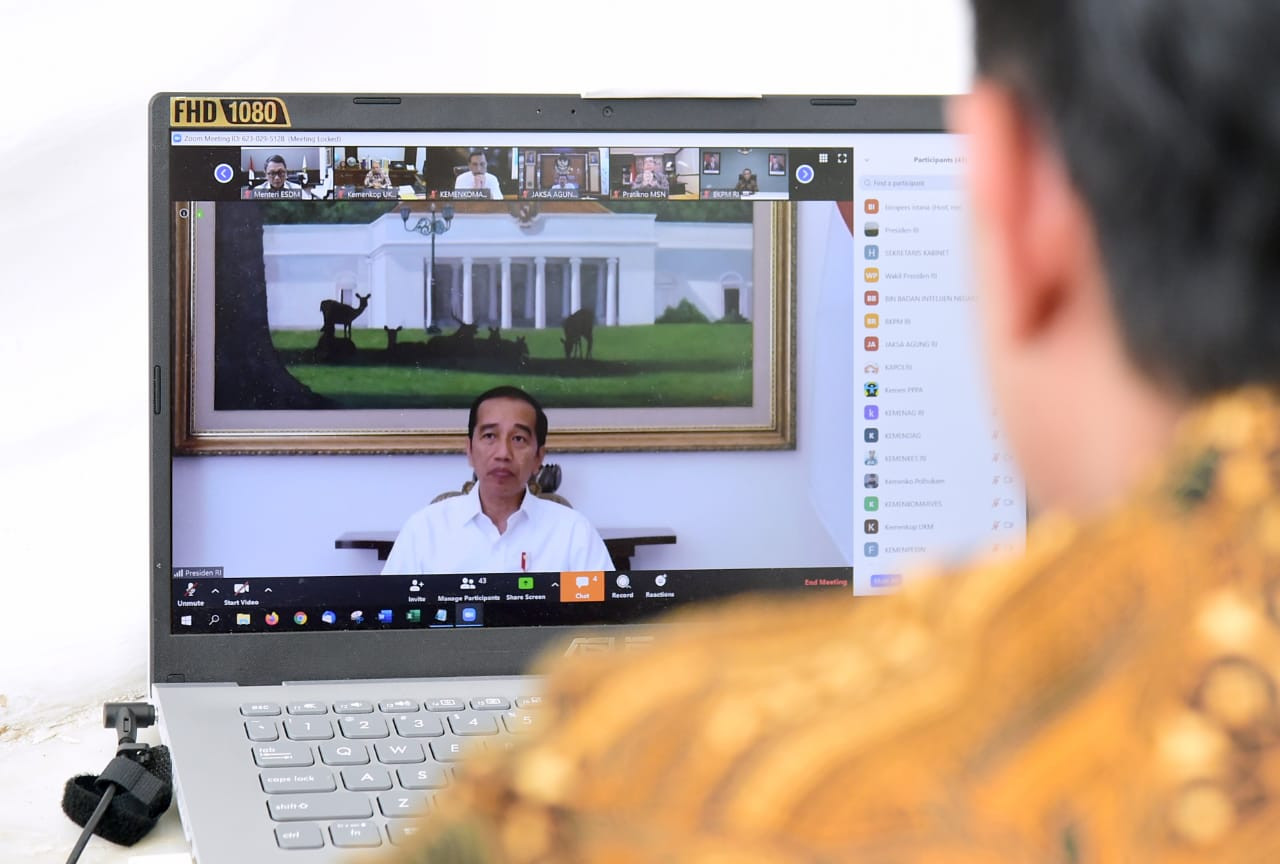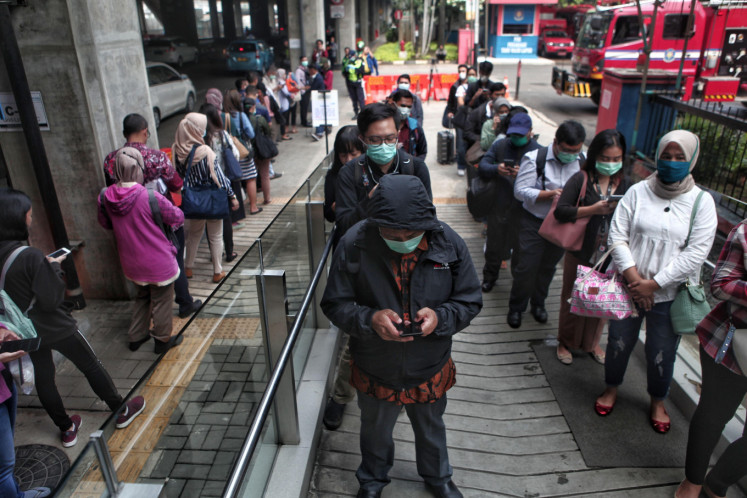Popular Reads
Top Results
Can't find what you're looking for?
View all search resultsPopular Reads
Top Results
Can't find what you're looking for?
View all search resultsCOVID-19: Patchy response to President's call to work from home
For several employees, including those in sectors that require direct contact with customers, working from home may not be a luxury and this has created confusion among employers looking to catch up with the President’s instruction and with public transportation packed during rush hour in Jakarta.
Change text size
Gift Premium Articles
to Anyone
P
roductively working from home, for those who can, is possible. That’s the message President Joko “Jokowi” Widodo and his Cabinet members are trying to project to reduce the rapid spread of the novel coronavirus disease COVID-19.
Jokowi led a teleconferenced Cabinet meeting on Monday after urging Indonesians to “work from home, study from home and worship from home”. He said in a press statement following the meeting: “Remote working I think has been effective in working hard to tackle both the coronavirus and economic slowdown.”
For several employees, including those in sectors that require direct contact with customers, working from home may not be a luxury and this has created confusion among employers looking to catch up with the President’s instruction and with public transportation packed during rush hour in Jakarta. Some others, however, have been quick enough to jump on the bandwagon and adopt the work-from-home policy.
Susan and Edgar—not their real names—are among those whose nature of work allows them to work from home but have yet to do so. They are concerned about going out and about during the COVID-19 pandemic, but their employers have not issued any official policy on social distancing as advised by the President.
Social distancing, a tool that public health officials recommend in attempting to slow the spread of a disease from person to person, means that people stay far enough away from each other to avoid infection.
“I went by my private vehicle today because I’m scared of having to go by the MRT [Mass Rapid Transit],” said Susan, a 32-year-old private sector employee who normally uses the MRT to commute to the office.
Read also: COVID-19: City-wide transport restrictions cause buildup at Transjakarta, MRT stations
Susan told The Jakarta Post that her company had implemented several precautionary measures including temperature checks before entering the office building, the signing of a declaration form for visitors and the limitation of business as well as personal travel for the previous two weeks.
However, she still has to work from the office, despite her understanding that it is possible for her work to be carried out from home.
“I do not know the answer [as to why the work-from-home policy had not been implemented]. Maybe the policy is still being formulated,” she said.
The experience from China, South Korea and Singapore has demonstrated that social distancing measures can prevent infection and save lives, on top of aggressive testing and contact tracing.
The World Health Organization has declared COVID-19 a global pandemic, having infected more than 170,000 around the world and claiming over 6,500 lives as of Monday. In Indonesia, 117 people have tested positive for COVID-19 with five deaths.
Edgar, a 23-year-old fresh-graduate working in the creative sector, told the Post on Monday that he chose to go to work by taxi that day, instead of going on his usual commuter line transport.
“I’ve heard that the commuter line from Bogor to Jakarta is the riskiest [for virus transmission], and the Transjakarta routes are limited, not to mention the long lines,” he said.
Passengers line up to enter Lebak Bulus MRT Station in Jakarta, on Monday. The Jakarta administration reduced the operations of city-operated public transportation to reduce the spread of the Covid-19 virus. (JP/Seto Wardhana)Edgar added that his line of work, which involved sorting out data and creating insights, could be done remotely, although there were a few tools and software that would operate faster using the office’s local-area network (LAN).
A number of companies have rolled out strict responses to the virus pandemic, issuing internal circular letters on mechanisms to work from home, avoiding both domestic and international business travel and promoting social distancing.
Local technology giant Gojek is one that has shared a comprehensive “work from home best practices” document sheet online, including tips on communicating and maintaining productivity levels from home while at the same time maintaining wellbeing.
“We are also conducting a work-from-home trial as well as deep-cleaning the office regularly,” chief of Gojek corporate affairs Nila Marita told the Post. Gojek has also been educating its drivers and employees on COVID-19 and how to reduce its spread, as evident in the app’s homepage.
Telecommunications firm Indosat Ooredo has also launched the #StayHomeStayConnected campaign to maximize digital technology and to maintain productivity for its clients and customers, which range from online lecturing to digital customer services. For Indosat employees, the company has implemented working from home since Monday until further notice.
Read also: Work-from-home policy in effect at major Jakarta companies over virus concerns
Digital payment platform OVO and online marketplace Tokopedia have also announced similar procedures.
“Today, OVO decided to enact a work-from-home trial for one week for nearly 1,000 OVO employees throughout Indonesia,” OVO president director Karaniya Dharmasaputra said in a written statement.
“Tokopedia requires all employees to work from home for one full week, as of today, March 16. Efforts to limit direct interaction [social distancing] are intended to support the prevention of COVID-19, in line with the instructions of the President of Indonesia,” Tokopedia vice president of corporate communications Nuraini Raza said in the release.
The work-from-home policy is being considered by companies across the globe as numbers of confirmed COVID-19 cases continue to rise worldwide.
Matthew McQueen, director, public health program and associate professor of integrative physiology of the University of Colorado Boulder in the United States wrote in The Conversation that the goal of social distancing is to “flatten the curve” of the highly transmittable virus spread.
He explained that the strategy of social distancing could be used in an effort to spread out the virus infections over a longer period of time so that public health agencies and healthcare infrastructure could better respond to the crisis and potentially “significantly reduce deaths from COVID-19”.
Finance Minister Sri Mulyani Indrawati posted on her Instagram account on Sunday a series of videos and photographs showcasing how she coordinated with her team via a conference call.
“On Saturday this week, I worked full time carrying out a coordination meeting through a conference call with the board of the Finance Ministry to draft policies and steps on the state budget [APBN] and the state finances in handling the spread of the coronavirus,” the minister wrote on Sunday.
“The meeting was done via video to reduce the potential transmission of the COVID-19 virus, but it remained effective in formulating policies and carrying out the tasks of the Finance Ministry.” (ydp)











